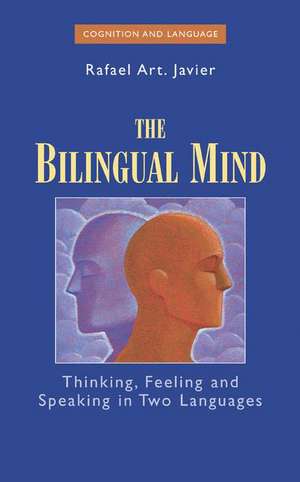The Bilingual Mind: Thinking, Feeling and Speaking in Two Languages: Cognition and Language: A Series in Psycholinguistics
Autor Rafael Art Javieren Limba Engleză Hardback – 20 iun 2007
Rafael Javier makes a convincing, empirically founded case for what he terms the bilingual mind, with its own particular approach to cognition, memory, and emotional and social development. From this framework, he proceeds to salient but seldom examined questions such as: What are the effects of bilingualism on cognitive development? Is some degree of language shifting always present in bilingual thinking? Do interpreters improve or compromise communication? What assessment instruments are best suited to bilingual individuals? What are the key issues in providing appropriate treatment interventions to bilingual patients? How can professionals be better trained to work with this population?
Given the prevalence of -- and controversies surrounding-- bilingualism today, the author intends his text to benefit a wide range of therapists, education professionals, and scholars. The Bilingual Mind will prove as valuable to the frontline clinician and the evaluator as to the linguistic student and the policymaker designing the future of bilingual services.
| Toate formatele și edițiile | Preț | Express |
|---|---|---|
| Paperback (1) | 634.00 lei 6-8 săpt. | |
| Springer Us – 19 noi 2010 | 634.00 lei 6-8 săpt. | |
| Hardback (1) | 640.24 lei 6-8 săpt. | |
| Springer Us – 20 iun 2007 | 640.24 lei 6-8 săpt. |
Din seria Cognition and Language: A Series in Psycholinguistics
- 15%
 Preț: 641.20 lei
Preț: 641.20 lei - 15%
 Preț: 639.08 lei
Preț: 639.08 lei - 18%
 Preț: 955.25 lei
Preț: 955.25 lei - 18%
 Preț: 946.87 lei
Preț: 946.87 lei - 18%
 Preț: 1384.88 lei
Preț: 1384.88 lei - 15%
 Preț: 646.11 lei
Preț: 646.11 lei - 5%
 Preț: 713.33 lei
Preț: 713.33 lei - 18%
 Preț: 1551.25 lei
Preț: 1551.25 lei - 15%
 Preț: 648.42 lei
Preț: 648.42 lei - 15%
 Preț: 648.74 lei
Preț: 648.74 lei - 18%
 Preț: 954.77 lei
Preț: 954.77 lei - 15%
 Preț: 646.43 lei
Preț: 646.43 lei - 18%
 Preț: 1560.11 lei
Preț: 1560.11 lei - 15%
 Preț: 644.49 lei
Preț: 644.49 lei - 18%
 Preț: 952.89 lei
Preț: 952.89 lei - 18%
 Preț: 953.03 lei
Preț: 953.03 lei - 15%
 Preț: 640.06 lei
Preț: 640.06 lei - 15%
 Preț: 638.11 lei
Preț: 638.11 lei -
 Preț: 381.81 lei
Preț: 381.81 lei -
 Preț: 382.75 lei
Preț: 382.75 lei -
 Preț: 385.08 lei
Preț: 385.08 lei - 18%
 Preț: 1716.18 lei
Preț: 1716.18 lei -
 Preț: 383.50 lei
Preț: 383.50 lei -
 Preț: 388.34 lei
Preț: 388.34 lei - 5%
 Preț: 372.38 lei
Preț: 372.38 lei
Preț: 640.24 lei
Preț vechi: 753.22 lei
-15% Nou
Puncte Express: 960
Preț estimativ în valută:
122.50€ • 127.92$ • 101.16£
122.50€ • 127.92$ • 101.16£
Carte tipărită la comandă
Livrare economică 15-29 aprilie
Preluare comenzi: 021 569.72.76
Specificații
ISBN-13: 9780387309132
ISBN-10: 0387309136
Pagini: 154
Ilustrații: XIV, 154 p.
Dimensiuni: 156 x 235 x 11 mm
Greutate: 0.41 kg
Ediția:2007
Editura: Springer Us
Colecția Springer
Seria Cognition and Language: A Series in Psycholinguistics
Locul publicării:New York, NY, United States
ISBN-10: 0387309136
Pagini: 154
Ilustrații: XIV, 154 p.
Dimensiuni: 156 x 235 x 11 mm
Greutate: 0.41 kg
Ediția:2007
Editura: Springer Us
Colecția Springer
Seria Cognition and Language: A Series in Psycholinguistics
Locul publicării:New York, NY, United States
Public țintă
Professional/practitionerCuprins
I. Bilingualism and Social Context. Linguistic communities. Fear of bilingualism? Traditional solution to the bilingual problem. Current state of affairs and the bilingual phenomenon.- II. Is There A Bilingual Mind? The bilingual process in context of the cognitive development. Evidence of the bilingual mind?.- III. Bilingual Linguistic Organization. The Coordinate-Compound Linguistic Organization Controversy. Compound linguistic system. Coordinate linguistic system. The Language Independence Phenomenon. Psychological/psychoanalytic observation. Psycholinguistic studies. Neurological evidence.- IV. Language Switching As A Communication. Factors Affecting Switching. Structural linguistic factors. Extra-linguistic and affective factors.- Role of stress in code-switching.- V. Bilingual Memory And Language of Affect. Bilingual memory models. Bilingual memory for meaningful information.- VI. Communication Through Interpreters. Communication process. Components of communication. Interpretation process. Challenges to accurate interpretation. Methods of interpretation. Common errors: Omission, Addition, Condensation, Substitution, Role exchange.- VII. Issues In Assessing The Bilingual Individual. Personal motivation/specific needs of the referring person. Linguistic challenges in the assessment process. Validity of the assessment instruments. Factors to be considered in assessing a bilingual individual. Selection of basic assessment instruments.- VIII. Treatment of the Bilingual Individual. Memory organization in bilingual patients. Nature of memory inaccessibility in a bilingual context. Technical consideration. Conclusion.- X. Future of Bilingualism: What Should Be Our Response? Traditional response. There is no easy solution to the bilingual dilemma. There are signs of hope.Only a flexible model makes sense.- General Recommendations.
Recenzii
From the reviews:“Provides a fresh perspective on crosscultural literature by placing a renewed importance on the role that bilingual experience plays in perception, memory, intelligence, learning and emotional formation. This book is mainly directed at therapists and education professionals. … SLA researchers can benefit from an innovative perspective to the bilingual mind that interweaves psycholinguistic issues with questions of identity and culture. … information about the languages spoken in the United States and an excellent overview of tests to assess less proficient and less acculturated bilinguals.” (Nuria Sagarra, Studies in Second Language Acquisition, Vol. 31 (3), September, 2009)
Notă biografică
Rafael Art. Javier, Ph.D., ABPP
St. John's University, Supervisor and Clinical Professor of Psychology, Center for Psychological Services and Clinical Studies.
St. John's University, Supervisor and Clinical Professor of Psychology, Center for Psychological Services and Clinical Studies.
Textul de pe ultima copertă
As bilingual individuals enter the educational system and the clinical landscape, they struggle with intricate, often painful questions of identity, culture, and assimilation. Professionals working with these individuals need to complement their knowledge of specific cultural issues with the psychological processes that all bilingual speakers share. The Bilingual Mind: Thinking, Feeling, and Speaking in Two Languages fills a critical gap in the cross-cultural literature by illuminating the bilingual experience in both its social and clinical contexts.
Rafael Javier makes a convincing, empirically founded case for what he terms the bilingual mind, with its own particular approach to cognition, memory, and emotional and social development. From this framework, he proceeds to salient but seldom examined questions such as:
-What are the effects of bilingualism on cognitive development?
-Is some degree of language shifting always present in bilingual thinking?
-Do interpreters improve or compromise communication?
-What assessment instruments are best suited to bilingual individuals?
-What are the key issues in providing appropriate treatment interventions to bilingual patients?
-How can professionals be better trained to work with this population?
Given the prevalence of -- and controversies surrounding-- bilingualism today, the author intends his text to benefit a wide range of therapists, education professionals, and scholars. The Bilingual Mind will prove as valuable to the frontline clinician and the evaluator as to the linguistic student and the policymaker designing the future of bilingual services.
Rafael Javier makes a convincing, empirically founded case for what he terms the bilingual mind, with its own particular approach to cognition, memory, and emotional and social development. From this framework, he proceeds to salient but seldom examined questions such as:
-What are the effects of bilingualism on cognitive development?
-Is some degree of language shifting always present in bilingual thinking?
-Do interpreters improve or compromise communication?
-What assessment instruments are best suited to bilingual individuals?
-What are the key issues in providing appropriate treatment interventions to bilingual patients?
-How can professionals be better trained to work with this population?
Given the prevalence of -- and controversies surrounding-- bilingualism today, the author intends his text to benefit a wide range of therapists, education professionals, and scholars. The Bilingual Mind will prove as valuable to the frontline clinician and the evaluator as to the linguistic student and the policymaker designing the future of bilingual services.
Caracteristici
Focuses on the bilingual experience in both its social and clinical context Provides practical information for parents, educators, and treating professionals to answer most commonly raised questions about the bilingual child/individual Draws on specific examples from the writer’s extensive experience assessing and treating bilingual children and adults Presents a comprehensive critical analysis of the relevant and current research data to show how the bilingual brain works and how bilinguals organize their emotions Highly illustrated for easy reading Includes supplementary material: sn.pub/extras











